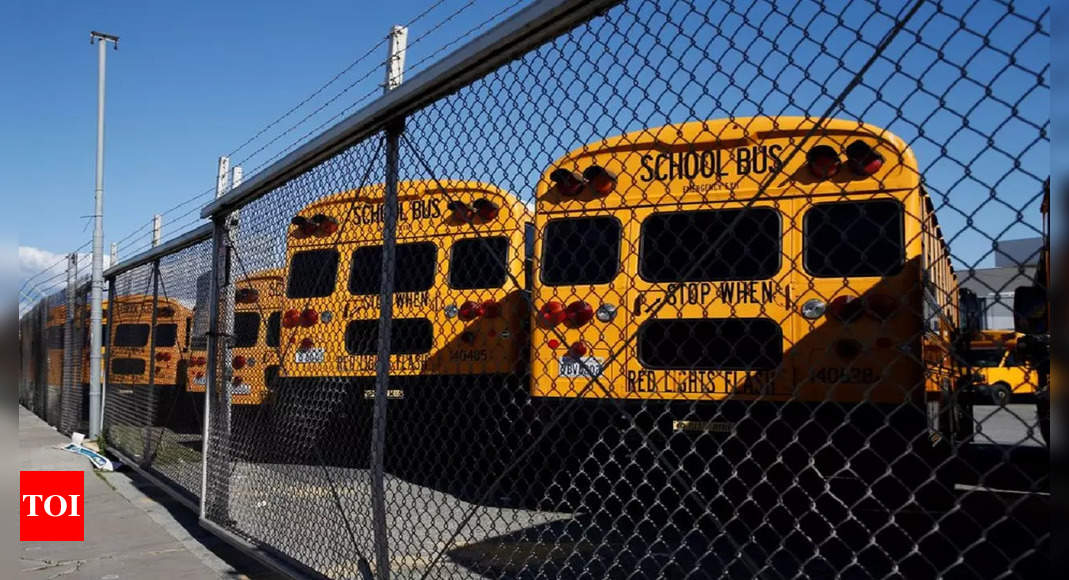Some US schools close after shooting rumors on social media – Times of India
[ad_1]
Although law enforcement officials cautioned that they did not know of any credible, specific threats Friday, school administrators in Texas, Minnesota, Missouri, Montana, central New York and Connecticut made the decision to close weeks after a deadly school shooting in Michigan and just before the winter holiday breaks of many schools.
But four of the country’s largest school districts — Chicago, Miami, New York City and Los Angeles — stayed open. In Los Angeles, officials said they were taking the warnings seriously, and in Miami-Dade County, officials said they were carefully monitoring the rumors and that there would be more police at schools in response.
Similar messages about school safety and threats were made by districts in Baltimore, Philadelphia and Seattle. Several schools near Houston asked for students to leave their backpacks at home. Fort Bend Independent School District in the Houston area sent the request in a notice to parents citing “several social media sites challenging students nationwide to threaten their schools.”
It was not clear where the warnings originated, but they had been circulating for days on many sites.
TikTok, the video-sharing site most often mentioned in local news reports, said in a statement Thursday that it was working with law enforcement “even though we have not found evidence of such threats originating or spreading via TikTok.”
The company said a search of its posts showed users warning about the threats but no evidence of anyone directly making or promoting them. “We are deeply concerned that the proliferation of local media reports on an alleged trend that has not been found on the platform could end up inspiring real world harm,” it said.
Rachel Racusen, a spokesperson for Snapchat, another platform mentioned in the reports, said in an email that the company was “closely monitoring” for any threats made on social media platforms.
A spokesperson for Facebook, which had also been mentioned, declined to comment.
Carson City School District in Nevada said the cancellation Friday was in effect starting scheduled winter breaks a day early.
In Gilroy, California, school administrators canceled classes at Gilroy High School, although the local police department said the threat against the school was not credible. The Gilroy Police Department said the post that seemed to involve the high school because it used the initials GHS was actually referring to a GHS in the Los Angeles area, about 300 miles away. The police there also deemed the threat not credible.
Gilroy Unified School District Superintendent Deborah A. Flores said in a letter to staff and families that the high school was closing in part because some in the community still experience trauma from the shooting at the city’s garlic festival in July 2019, where three people were killed.
Threats against schools sometimes come in waves after shootings, prompting officials to increase security. Just over three weeks ago, a teenager opened fire at Oxford High School in Michigan Nov. 30, shooting 11 people and killing four students.
On Friday, law enforcement agencies around the country appeared to be increasing their presence at schools in response to the social media rumors.
The North Port Police Department in Florida said that, out of an abundance of caution, the department would provide additional resources to local schools Friday and encouraged parents to talk with children about the seriousness of making threats. A similar police presence was expected across public schools in Cincinnati.
In a statement on Twitter, the FBI urged people to contact police or federal authorities if they saw a threat against a school. “DO NOT share or forward the threat,” the bureau said. “Doing so can spread misinformation and cause panic.”
There was a similar wave of closures and increased police presence at schools in late October, after districts reported seeing vague threats on Snapchat and TikTok.
Jillian Peterson, a professor of criminology and criminal justice at Hamline University in St. Paul, Minnesota, and a co-founder of the Violence Project, a research center that studies gun violence, said threats on social media are especially complicated for schools because they are anonymous and not specific.
“The number of threats in the last two weeks is astronomical and schools are not resourced to do this,” Peterson said. “They are not investigative bodies; they are trying to educate children.”
She added, “The majority are jokes and hoaxes but you never know when one isn’t and so you have to take every single one seriously.”
Peterson said she was also concerned that this type of nationwide trend could convince someone who has been contemplating violence to act on it.
Mathieu Deflem, a professor of sociology at the University of South Carolina, said the emotional and financial costs of responding to threats, credible or not, “can be tremendous.”
But officials have little choice but to respond in some way, he said.
“Given that school shootings do happen and do cause so much harm when they happen, how can anyone not treat a potential threat seriously?” Deflem said. “I don’t think authorities can be blamed for overreacting, because we don’t know until later than it is even overreacting rather than being preventive.”
[ad_2]
Source link


Comments are closed.